Britten Weekend, Snape review - diverse songs to mostly great poetry overshadow a problem opera | reviews, news & interviews
Britten Weekend, Snape review - diverse songs to mostly great poetry overshadow a problem opera
Britten Weekend, Snape review - diverse songs to mostly great poetry overshadow a problem opera
Pianist Malcolm Martineau marshals 10 committed singers for the complete song cycles
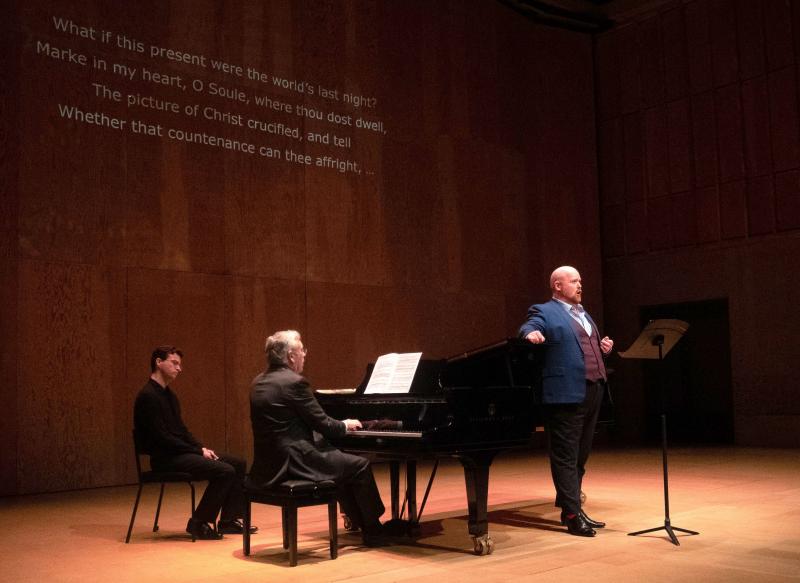
In usual circumstances, a fully staged opera and every voice-and-piano song-cycle by a single genius in one weekend would be an embarrassment of riches. The only problem about Britten hitting the heights, above all in setting toweringly great poetry by Auden, Blake, Donne and Hölderlin, at the top of a long list, meant one sitting and squirming at most of Ronald Duncan’s wretched lines for an opera which even in its very subject is problematic, The Rape of Lucretia.
Oliver Mears’ production (pictured below, both production images by Camilla Greenwell), originating here at Snape Maltings with Britten Pears Arts before travelling on to co-host the Royal Opera, also had its awkwardnesses (★★★), most of them carried by a fine young cast and stunning sounds from 12 players of the Aurora Orchestra under the urgent guidance of Corinna Niemeyer. But by then the profound insights of the Sechs Hölderlin-Fragmente and the gritty, uncompromising Songs and Proverbs of William Blake in the first of Malcolm Martineau’s great song-cycle labour of love in the Britten Studio (★★★★★) were still resonating, and it was hard to re-tune to laboured poetry, however well set. 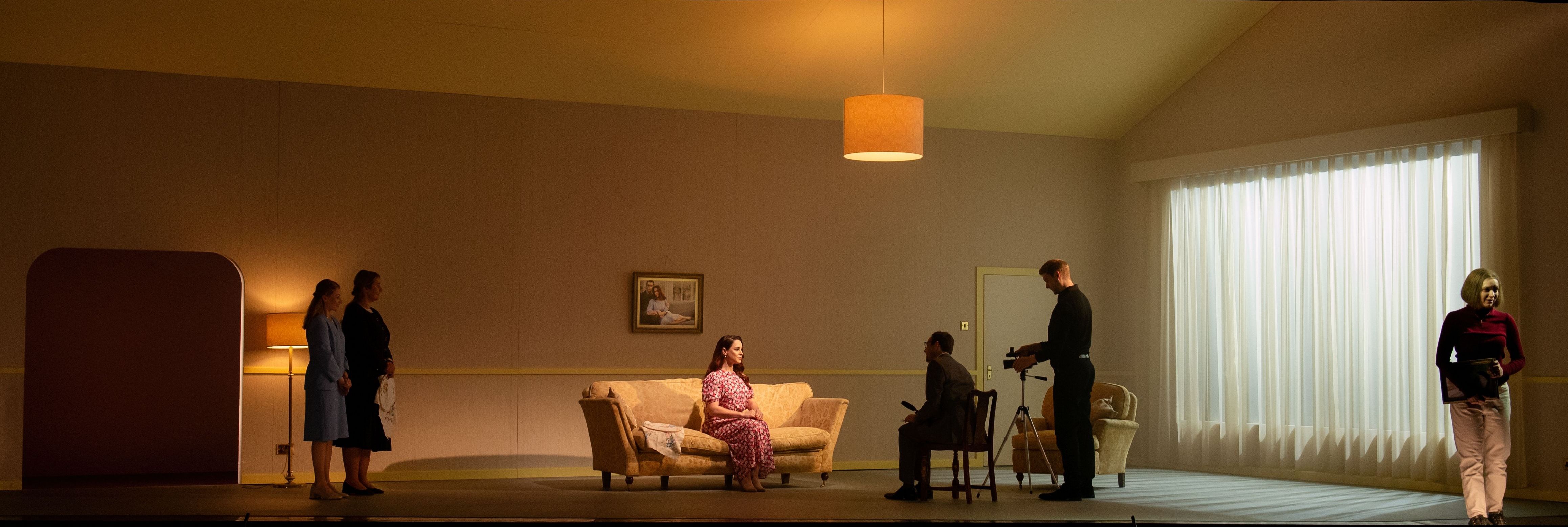 Martineau’s distinguished colleague in the world of working at the piano with singers, Graham Johnson, began his essay on “Voice and Piano” in The Britten Companion by declaring that the composer “is almost unique in that the high quality of his operas does not diminish the stature of his songs with piano”. The colours and unorthodoxies in his piano writing, illuminated in every phrase and gesture by Martineau at the height of his powers, certainly equal those in his orchestras great or small. And The Rape of Lucretia carries us through difficult scenes with unforgettable ideas – the harp’s cricket-stridulation in the first nocturne, alto flute and bass oboe as Lucretia sleeps, cor anglais turning the anguished screw of the rape’s aftermath, to name but three – sounding so present from the Aurora players in the Maltings’ very lively acoustics.
Martineau’s distinguished colleague in the world of working at the piano with singers, Graham Johnson, began his essay on “Voice and Piano” in The Britten Companion by declaring that the composer “is almost unique in that the high quality of his operas does not diminish the stature of his songs with piano”. The colours and unorthodoxies in his piano writing, illuminated in every phrase and gesture by Martineau at the height of his powers, certainly equal those in his orchestras great or small. And The Rape of Lucretia carries us through difficult scenes with unforgettable ideas – the harp’s cricket-stridulation in the first nocturne, alto flute and bass oboe as Lucretia sleeps, cor anglais turning the anguished screw of the rape’s aftermath, to name but three – sounding so present from the Aurora players in the Maltings’ very lively acoustics.
The singers sometimes needed to know that no forcing is necessary in this venue. But they all had distinctive vocal timbres and dramatic intelligence. Most singular in varied colours was Sydney Baedke’s Female Chorus, offsetting some of the necessary stridency with the softest singing in the lullaby, while Anne Marie Stanley’s Lucretia heralded the arrival on the scene of another striking contralto and Sarah Dufresne as Lucia was the perfect light lyric soprano. If the men had less impact, that’s partly to do with Britten’s characterisations. It’s problematic that he and Duncan ask for Tarquinius (Jolyon Loy, pictured below with Stanley) to be a lithe hunk – part of the nature of the panther-tyrant – which cues shirt-off time, and take us up to the moment of “ravishment” (Lucretia later sings the substituted word “rape”). 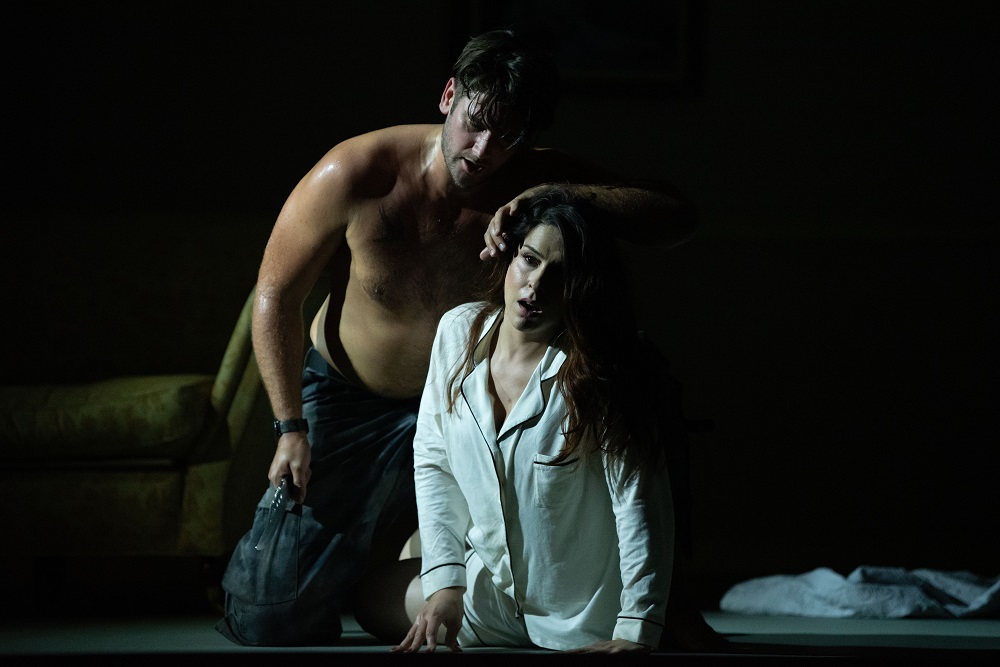 Annemarie Woods’ all-contemporary setting, with the action taking place in a single living-room, undercuts the original idea of a pagan “then” and a Christian “now” – not, in any case, very successfully argued by the libretto – though Lucretia’s suicide was supremely shocking. Does it weaken the decency of husband Collatinus (Anthony Reed) unnecessarily to see him participating in the abuse of a woman hostage in Scene 1? Certainly the memory of it is hard to banish when he tries to console Lucretia with simple goodness. At least in Act Two the complex tug-of-war in the music takes over. But of all the Britten operas, this is the only one I love less the more I encounter it live.
Annemarie Woods’ all-contemporary setting, with the action taking place in a single living-room, undercuts the original idea of a pagan “then” and a Christian “now” – not, in any case, very successfully argued by the libretto – though Lucretia’s suicide was supremely shocking. Does it weaken the decency of husband Collatinus (Anthony Reed) unnecessarily to see him participating in the abuse of a woman hostage in Scene 1? Certainly the memory of it is hard to banish when he tries to console Lucretia with simple goodness. At least in Act Two the complex tug-of-war in the music takes over. But of all the Britten operas, this is the only one I love less the more I encounter it live.
Questions of Christian belief and Christ’s sacrifice work so much better in The Holy Sonnets of John Donne, a true masterpiece composed two years earlier, in 1945, so even closer to the horrors of the Second World War and what Britten had witnessed, playing alongside Yehudi Menuhin to concentration camp survivors in Germany. Tenor Nicky Spence’s immense vocal range in league with Martineau’s powerful austerity made this a totally moving experience, as great a meditation on mortality as any in the literature of song. Philosophical depths were struck the previous afternoon by Robin Tritschler in the later, more aphoristic Hölderlin Fragments and Marcus Farnsworth in the Blake cycle – including Britten’s second, and most devastating setting of “A Poison Tree” (Benjamin Hulett made powerful work of the first on Saturday afternoon). A fourth tenor, James Way, explored with total naturalness the singular mix of innocence, experience, charm and melancholy in the Thomas Hardly cycle, Winter Words. Though the projection didn't work throughout, the handsomeness of the texts and translations as projected on the back wall of the studio reinforced Britten's daring in choosing the best. 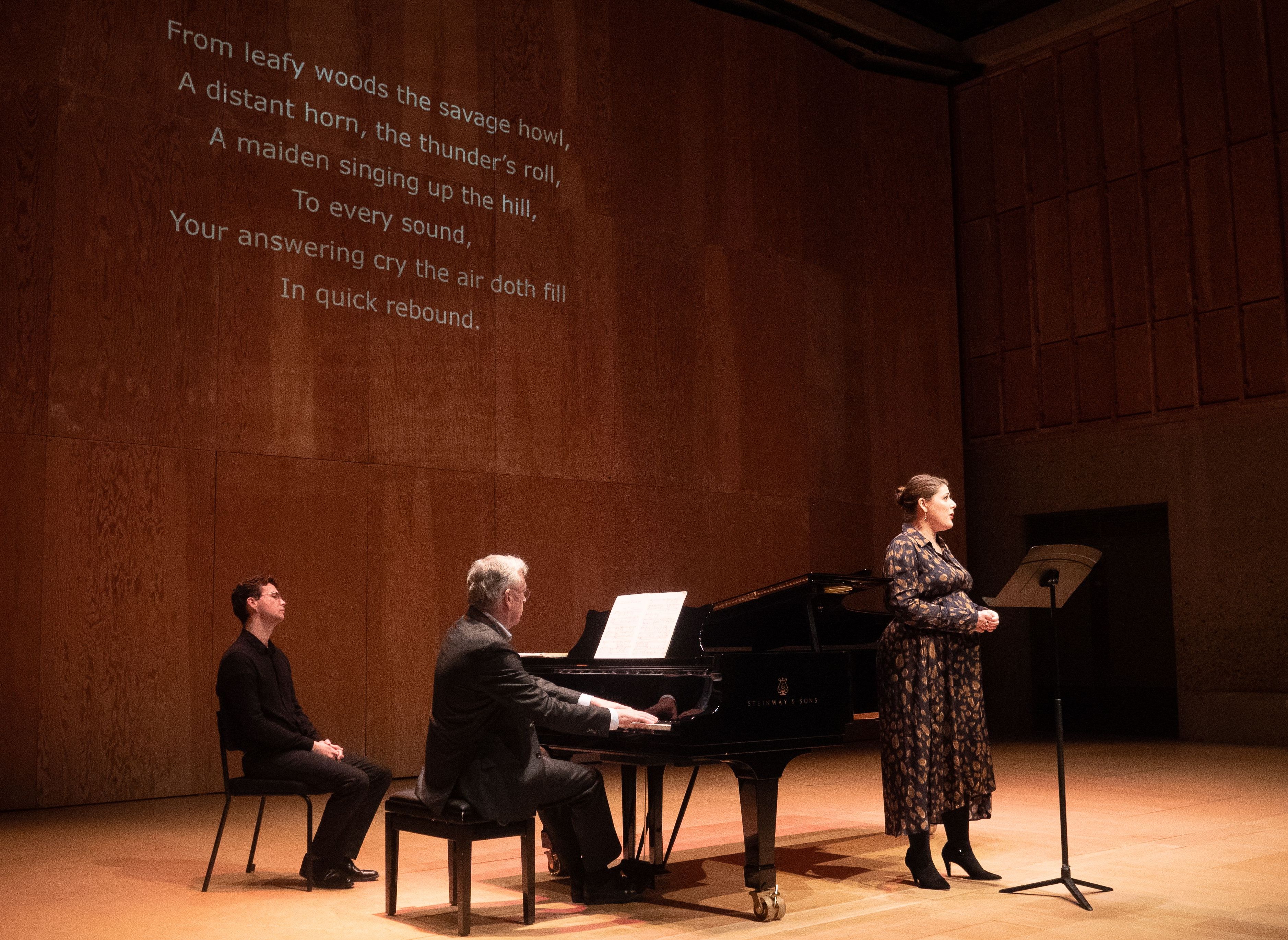 The beauty of the series as a whole was how deep each and every singer went in to each different world – Martineau’s guidance must have helped – so that there were no invidious companions between voice-types. This was as true of the two Britten Pears Young Artists as it was of the more experienced participants: like Spence, Siân Dicker (pictured above with Martineau) used the full range of a lyric-dramatic voice, in this case to inflect Pushkin’s Russian in The Poet’s Echo, while equally personable mezzo Lauren Young (pictured below) at the end of A Charm of Lullabies managed to usurp Martineau’s prerogative in fading to nothing, a remarkable skill in a fledgling star.
The beauty of the series as a whole was how deep each and every singer went in to each different world – Martineau’s guidance must have helped – so that there were no invidious companions between voice-types. This was as true of the two Britten Pears Young Artists as it was of the more experienced participants: like Spence, Siân Dicker (pictured above with Martineau) used the full range of a lyric-dramatic voice, in this case to inflect Pushkin’s Russian in The Poet’s Echo, while equally personable mezzo Lauren Young (pictured below) at the end of A Charm of Lullabies managed to usurp Martineau’s prerogative in fading to nothing, a remarkable skill in a fledgling star.
The lighter spheres made less demands, though Anna Dennis launched the series with poise and incandescence in Britten’s early (1937) Auden sequence On This Island – memorable ideas, not by then always entirely felicitous word-setting. Auden also ended that opener in the astoundingly choice words of the Cabaret Songs. What a masterstroke to invite mezzo Fleur Barron, using the contrast between Carmenesque chest voice and brilliant upper register to vamp or intensify the situations. Baritone Peter Brathwaite perhaps drew the short straw in Tit for Tat, what Britten called “titivated” juvenilia setting Walter de la Mare, suddenly coming in to focus as the human plunderer of nature, Tom Noddy, is imagined getting his just deserts. 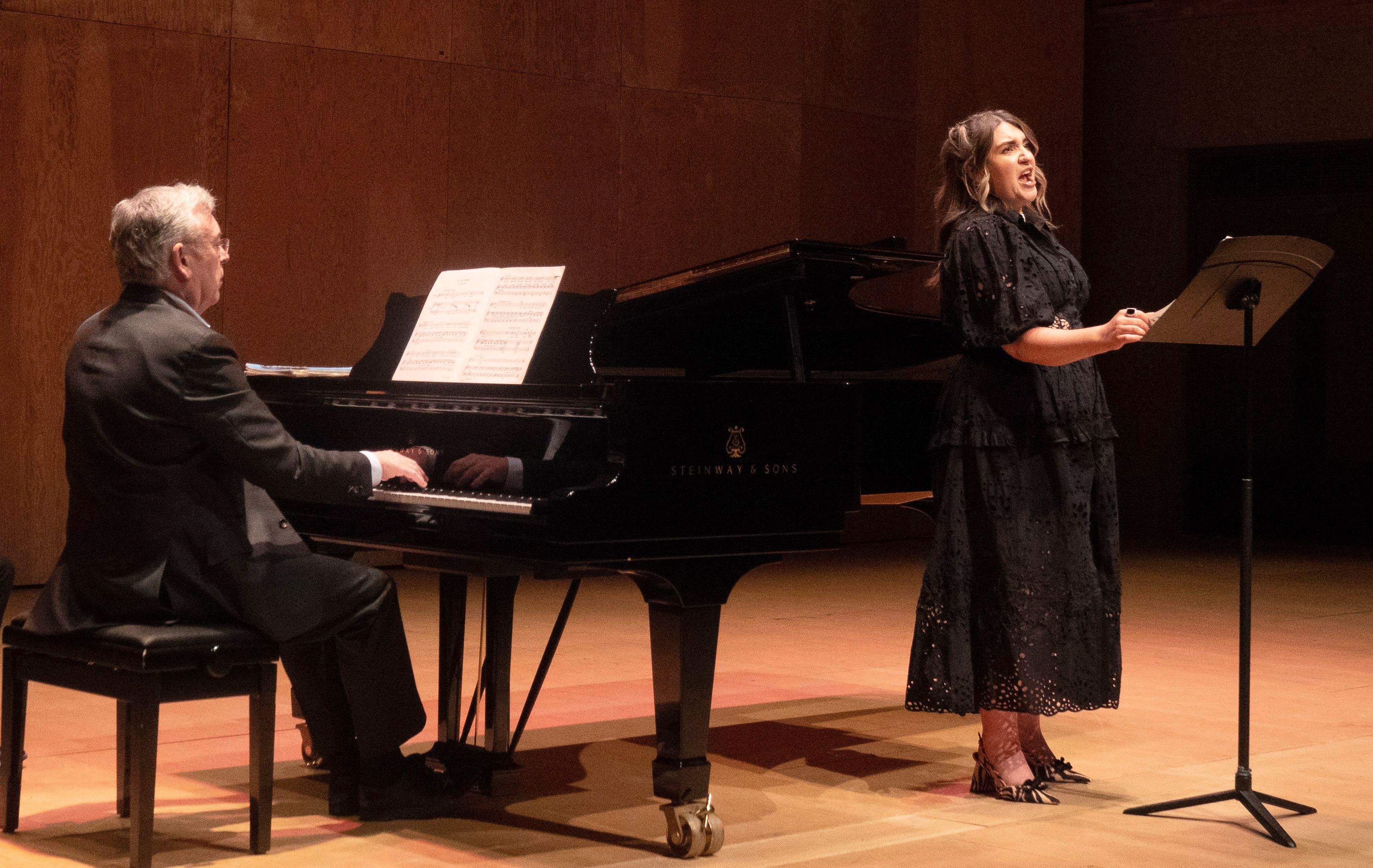 Hatred of bloodsports also informs the later stages of Who are these children?, the last sequence to be composed setting Scottish poet William Soutar; not wholly successful as a cycle, perhaps, but Spence’s by-heart grasp of both the Scots-dialect and the English-language songs riveted, along with telling gestures and perfect acknowledgment of his pianist-collaborator, from start to finish. The actual finale of the marathon was unintended; Hulett found himself gastrically stricken on Sunday morning, hoped to be better by the afternoon – Spence sang his Soutar as well as his Donne in the second recital – but wasn’t. Heroically, Tritschler agreed to sing the glorious Seven Sonnets of Michelangelo, as erotically charged as Canticle 1 (working on two levels as a Song-of-Solomonesque hymn of love). The electricity of the moment took over, and as it turned out there could have been no more radiant end to it all than the final exultation. Bravissimi tutti.
Hatred of bloodsports also informs the later stages of Who are these children?, the last sequence to be composed setting Scottish poet William Soutar; not wholly successful as a cycle, perhaps, but Spence’s by-heart grasp of both the Scots-dialect and the English-language songs riveted, along with telling gestures and perfect acknowledgment of his pianist-collaborator, from start to finish. The actual finale of the marathon was unintended; Hulett found himself gastrically stricken on Sunday morning, hoped to be better by the afternoon – Spence sang his Soutar as well as his Donne in the second recital – but wasn’t. Heroically, Tritschler agreed to sing the glorious Seven Sonnets of Michelangelo, as erotically charged as Canticle 1 (working on two levels as a Song-of-Solomonesque hymn of love). The electricity of the moment took over, and as it turned out there could have been no more radiant end to it all than the final exultation. Bravissimi tutti.
Share this article
The future of Arts Journalism
You can stop theartsdesk.com closing!
We urgently need financing to survive. Our fundraising drive has thus far raised £49,000 but we need to reach £100,000 or we will be forced to close. Please contribute here: https://gofund.me/c3f6033d
And if you can forward this information to anyone who might assist, we’d be grateful.

Subscribe to theartsdesk.com
Thank you for continuing to read our work on theartsdesk.com. For unlimited access to every article in its entirety, including our archive of more than 15,000 pieces, we're asking for £5 per month or £40 per year. We feel it's a very good deal, and hope you do too.
To take a subscription now simply click here.
And if you're looking for that extra gift for a friend or family member, why not treat them to a theartsdesk.com gift subscription?

Add comment